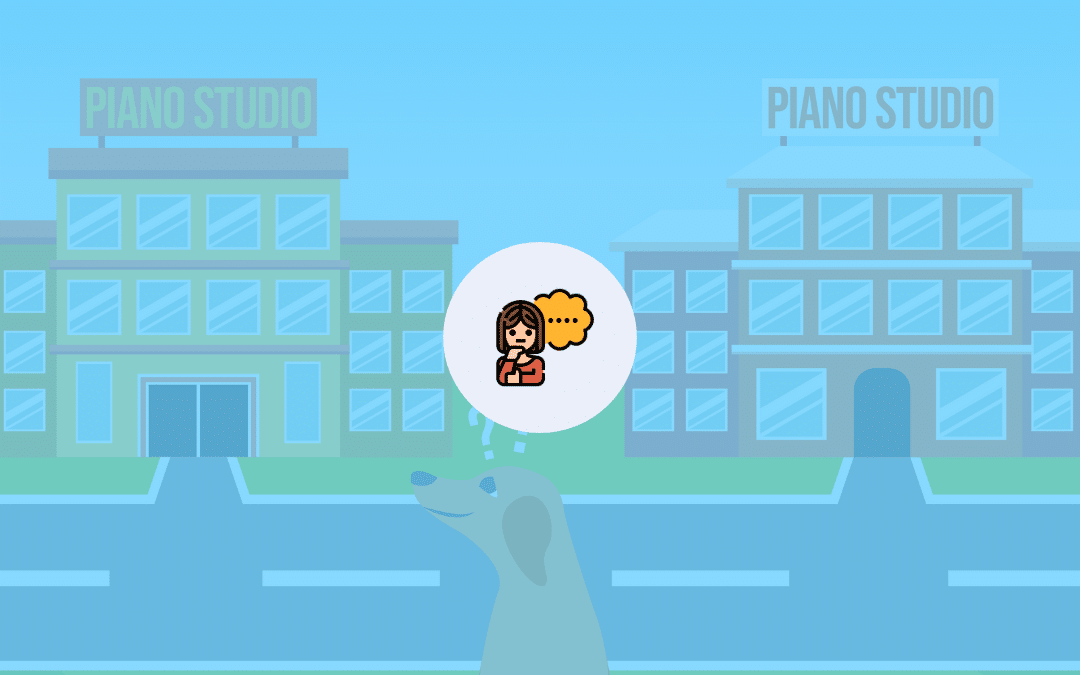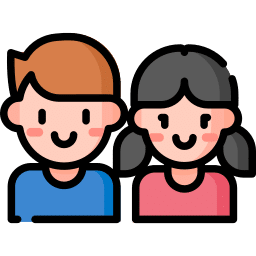First of all, I commend you for taking the time to learn about this exciting and somewhat overwhelming journey that is learning to play the piano!
I consider myself a teacher first and businesswoman second.
I’m here to be your guide and help you as well as piano parents through the process of choosing a piano teacher because, believe me, I know how hard it can be. I had to choose one, too!
My commitment to you is honesty and transparency because my greatest hope is that you’ll use the information I provide to make an empowered decision.
Even if you don’t take lessons at my studio, I want each step of this process — from researching, choosing a teacher, to making sure you have the proper instrument at home —to be a great experience.
In case you’re not familiar with me, I’ve been helping people just like you learn how to play piano for over a decade.
I really want to take all the stiffness and intimidation out of piano, while injecting some fun and show people how “not so scary” the piano is once you learn a few basic things.
How Much Do Piano Lessons Cost?
In this section, I’ll give you an overview of the things that determine how much you can expect to invest in piano lessons.
Let’s start by understanding that choosing a piano studio is a lot like choosing a car. The price really depends on a wide range of factors including business overhead, teacher education, and lesson length.
Assuming that you are like most people and prefer to take lessons from a qualified teacher instead of hopping on YouTube and trying to teach yourself, your budget can be broken down into the following five categories:
- Business’ Overhead
- Location
- Lesson Length
- Student’s Skill Level
- Education Level of the Teacher
Business’ Overhead
Depending on where the piano teacher is located (big box store v. in the teacher’s home), prices of lessons can vary.
Music studios that teach a bunch of instruments and have a lot of employees will have high overhead costs that will, in turn, be passed down to you as the consumer. Your lesson cost will include what it takes to maintain all the instruments, pay the teachers, pay for insurances, etc.
Location
Depending on the studio, piano lessons can be taught in the student’s home in person or online, in the teacher’s home, or in a music studio.
Teachers who travel to your home will have additional travel costs included in their rate or added as an additional cost, whether they’re an employee at a music studio or have their own private studio.
This additional cost can be anywhere from $10-25 so it’s usually more affordable to travel to your teacher than the other way around.
If you travel to your teacher for lessons, you’ll have a high-quality instrument and extra resources provided for you at their location, which ensures you learn properly. If you take lessons in your own home, you’ll be learning on your own instrument so it’s important that you have a solid setup at home with a proper instrument.
Either way, it’s a responsibility to have a quality instrument at home to practice on in between lessons as well.
Lessons Length
Lessons can last from 30 minutes to 60 minutes and are priced accordingly.
Private 1-1 lessons usually have 30 or 45-minute options for beginner/intermediate lessons, which isn’t a lot of time to learn, but those on a budget may like the option.
Group lessons are normally longer and maybe a bit less expensive, but it depends on the studio.
Lab lessons have multiple students in the same class, but students learn independently with headphones with the teacher and work at their own pace on their own music, not as a group.
Group and lab lessons are no less effective than private lessons to learn the piano.
If you’re going the private lesson route, then expect prices to be a bit higher because those teachers can only spend that hour with one student.
Student’s Skill Level
A lot of teachers charge more if you’re an advanced player because you require a more skilled and educated teacher and those teachers cost more.
There are often specific lessons for beginners/intermediates (usually between 30-45 minutes long) and then a separate program and price for advanced lessons, which are 60 minutes long and you may have to audition for them.
Education Level of Teacher
Many piano teachers are highly accomplished musicians with degrees, years of teaching experience, and performing experience.
What these teachers charge will reflect this expertise and education. They’ve spent years honing their skills and paying for education so their prices will reflect that.
If Teacher A went to music school and has a degree/s in performance and education, has been professionally taught to play, has years of teaching and performing experience and Teacher B does not have a degree in music/education, is self-taught, cannot play advanced music, and has only played piano as a hobby, you’d expect to pay Teacher A more, right?
When it comes to education, you want to look at more than just the price. You may spend less money on the cheaper option, but you’ll pay in the long run by developing bad habits, not reaching your goal, and eventually having to find a new teacher.
If you want to avoid having to find a new teacher, I have two pieces of advice for you:
- Make sure your teacher went to school for piano and they’re not a flute or trumpet or guitar teacher who teaches piano on the side.
- Make sure they teach the style of music you want to play.
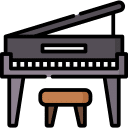
Lab vs. 1-on-1 vs. Group: Which Piano Lesson Style is Best?
I am thrilled I get to cover this section and to finally shed light on the real differences between these three teaching styles that will empower you to make a sound decision.
What I won’t do is mention other teachers. Instead, I’ll go over the three different styles and then show you exactly why I switched from teaching 1-on-1 to lab lessons for beginners and intermediates and only offer 1-on-1 lessons to advanced students.
Lab Lessons
Lab-style lessons are a radically new and cutting edge way to learn to play the piano. They are different from group lessons because you wear headphones and are not learning as a group at all.
Every student is learning what they want to learn at their own pace and level.
You don’t have to keep up with anyone or play with anyone either. Nobody hears you and you don’t hear them.
You get 1-1 teaching and are given the privacy to practice what you just learned on your own.
Private 1-on-1 Lessons
Many people think that the only way to properly learn how to play the piano is with private lessons because that’s the way it’s always been done.
Private lessons are usually priced higher because the teacher can only meet with you for that entire hour or 30 minutes.
When I exclusively taught 1-on-1 lessons, my students did get a ton of attention for that whole lesson, but it actually did them a disservice because they relied so heavily on me to be there listening and problem-solving for them.
They were also not getting enough practice time within the lesson to finish songs and get guidance. Many people feel they need all that attention, but they don’t. We don’t learn 1-on-1 in school, sports, dance, the arts, etc., so why piano?
Group Lessons
In group lessons, everyone should have their own instrument, but in some cases, students have to share an instrument.
Group lessons are not to be confused with lab lessons because in group lessons, you ARE taught as a group.
Everyone is taught the same exact thing and you have to be at the same level as everyone else. You need to keep up with the class and often play in front of or with the other students in your class.
Group lessons are pretty much exactly how you learn in school and tend to be very limiting when it comes to learning what YOU want to learn and going at your own pace that’s comfortable for you.
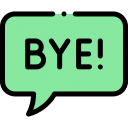
3 Reasons Why I Left Traditional 1-on-1 Lessons Behind
Students Were Progressing at a Slow Rate
With 1-on-1 lessons, students got my whole, undivided attention. Sounds great, right?
Wrong! Students learned to depend on me to spoon-feed them answers instead of having time to solve the problem themselves or practice independently.
Because of this, students would go home, try to practice, and feel lost without a teacher there telling them what to do every second.
Then, they’d come to their next lesson having made little to no improvement, and the cycle would repeat this was exhausting for them.
Students Were Asking the SAME Questions Week after Week
“Where do I put my hands?” and “I don’t know what notes to play” became routine statements.
Students were forming habits of depending ENTIRELY on me for information and answers instead of using their own problem-solving skills to navigate a piece of music.
They weren’t fully listening to their own playing because I was constantly over their shoulder listening for them. It was easier to just ask me than to figure it out themselves. My constant attention was a crutch.
Students Felt Anxious at the Piano, and Gave Up Easily
Many of my students would try out a song during a lesson, make a mistake, and then feel like giving up.
Giving up felt easier than attempting a new song because they were forced to play for an audience (ME) during the whole lesson. They had no privacy to take risks, build confidence or make mistakes!
I spent so much time during lessons cheering students on and giving pep talks that I knew something needed to change.
Here’s How I Fixed All Those Problems with Lab Lessons
Since switching from private to lab lessons, students are working through problems themselves better and advancing MUCH faster. They are flying through songs that used to take weeks to get through.
Why?
Because they have that practice time within their lesson that they weren’t getting in private lessons.
They get double the amount of time they’d normally get with a beginner private lesson and they aren’t having to figure their music out at home because they’ve already learned it at their lesson with my guidance.
Now, instead of students coming to their lessons unprepared and still confused, they get to move to new material in each lesson and I am a happy teacher.
Instead of me being there every single moment and students looking to me for all the answers, they now have to listen to their own playing and learn how to problem-solve.
Since I’m not right there to immediately ask the same questions to over and over again out of laziness, students are retaining information better and being resourceful to find solutions to questions they know they’ve asked me a million times.
Since they are finding solutions by themselves, they are able to use that resourcefulness at home when I’m not around instead of feeling stuck without me.
My approach reduces students’ anxiety and improves their confidence with piano.
Instead of demanding that students go home and learn their songs on their own, students have the privacy to practice at their own pace and learn how to play all of their songs during the lesson without me hovering over them.
This means students leave their lessons feeling proud and excited to go home and review songs they’ve already mastered.
This format of piano lessons focuses on supporting students and reducing stress both in lessons and at home.
I believe in lab lessons SO much, that it’s the only format I accept beginner and intermediate students into. The small lab setting allows you to receive the personal attention you need, and the privacy required to take risks and improve your sight-reading without me hovering over you.

Big Box Music Store vs. Boutique Piano Studio: Which One Is Better?
Big box music stores are bigger companies like Sam Ash, Guitar Center, etc.
They have tons of locations all around the country and they have large operations and tons of teachers as employees.
Boutique piano studios are the smaller studios that have one-off commercial spaces in one town or are run out of teachers’ homes.
Whichever one you choose, it’s good to know the pros and cons before making your decision.
Big Box Music Stores
Pros
With big-box music stores, you get the benefit of it being a more established studio with more money.
It has managers and higher-ups to talk to or file complaints with, they have tons of teachers to choose from, they often give makeup opportunities for missed lessons, and they teach many other instruments if that’s something you’re looking for.
Cons
The downside is that because they’re bigger, their overhead costs are higher and those costs trickle down into the cost of your lessons.
The teachers who work at these stores are often underqualified to teach piano, meaning they might not have a degree, might not be able to teach more than beginner piano, might not be formally trained, and might not have much teaching experience.
These music stores don’t pay their teachers a lot (I know because I used to work for them back in the day) so the teachers who tend to work there teach as a hobby or are very young, just out of college, looking for a part-time gig.
If you take the time to read the bios for these teachers, you’ll find that the majority of the piano teachers aren’t actually pianists who can play advanced piano or even teach it.
You’ll see that most of the piano teachers are tuba majors or guitarists who happen to know a little piano so make sure you take the time to read everything about the teacher you’re placed with.
Boutique Piano Studios
Pros
Boutique piano studios have a more personal feel to them. There’s often only one teacher, sometimes a couple of employees, and their overhead costs are pretty low, comparatively, so your lesson costs are a bit lower.
More often than not, the teacher is more qualified to teach you from A-Z, has a degree and years of teaching experience. You’re not just another student, you’re a part of a studio family in these studios.
Cons
The downsides to boutiques are that the teacher is both the teacher and the owner so there’s no higher up to complain to if things go wrong, there are less teachers to choose from, they sometimes don’t provide makeup opportunities because there is only one teacher and they may not have time in their schedule to give them, and they tend to only teach one instrument.
So if you consider all the pros and cons, I would definitely recommend taking lessons from a boutique studio.
There’s a more personalized touch to your lessons, there’s a higher level of education and experience with those teachers and you know you’re not one of hundreds.

What Do I Need In Order to Start Lessons?
In order to make the most progress, you’ll want to set yourself up for success from the start. So here are the basics that you need in order to hit the ground running.
The Right Kind of Keyboard or Piano
You’ll need a quality instrument to practice on at home. It is highly recommended that you have either an acoustic piano or a digital piano with 88, fully-weighted keys to learn properly on.
Any keyboard that has less than 88 keys or has semi- weighted/non-weighted keys is doing yourself a huge disservice and you will be holding yourself back so budget a few hundred dollars minimum for a good instrument.
The less you spend, the lower the quality of the instrument so good teachers will never recommend you get low-tier instruments.
Here’s an example of a higher-end digital piano: Yamaha YDP144 Arius Series Piano and here’s a middle-tier digital piano: Yamaha P45.
You can often find these instruments used on Facebook Marketplace and eBay. You also want to make sure that you have a bench and a sustain pedal. If your instrument did not come with one, don’t worry, you can buy them separately.
Other Items
You’ll also need your lesson books (which I’ll provide you), a pencil, an assignment notebook, and a metronome if you don’t have a digital piano with one already installed on it. Other than those physical things, you should also have time in your schedule to devote to lessons and practicing!

How Do I Find a Quality Piano Teacher?
The purpose of this section is to provide you with the tools and insights needed to help you find a good, qualified piano teacher who gets you to your goals and helps you become the kind of player you want to be.
If teaching yourself from YouTube is not your thing, then this may be the most important chapter in the book.
Why?
The piano teacher you entrust to teach you piano will be the reason you end up hating piano and music altogether or successfully sitting behind the piano and knowing exactly how to make music come from your fingers.
It’s that important! After talking with literally hundreds of piano students from all around the country over the past 10 years, I’ve seen the good, the bad, and the ugly of the piano lessons industry.
All of my experience regarding teachers can be summed up in this one statement:
IT’S A THOUSAND TIMES HARDER TO UNLEARN A BAD HABIT THAN IT IS TO LEARN PROPERLY FROM THE START
The truth is that there are vast differences from one teacher to another. You don’t have to look hard on the internet to find horror story after horror story about a mean old crockety piano teacher.
This is a smudge on the face of our industry, and it’s why this is clearly your biggest decision as a potential piano student.
This is also why it’s critical to have at least a basic understanding of the different piano lesson styles and what goes into the cost of lessons before you start learning to play so you know what a quality teacher looks like and what questions to ask.
But before we delve into how to find the right piano teacher, I want to discuss two reasons people often choose the wrong teacher: price and distance to the studio.
I ask that you please do your due diligence when choosing your piano teacher. Don’t simply go with the cheapest price or the one that’s the closest. Despite what you may be thinking right now, you probably will be tempted to do so at some point.
Yes, of course, these two factors should be considered. You don’t want to be gouged from a price standpoint and you certainly don’t want to drive 55 miles to get to your lesson, but hasty decisions lead to regret.
No one is interested in spending their time and hard-earned money only to end up with regret. A few short tasks can help ensure you find a high-quality piano teacher.
Step 1: The Interview
Once you’ve determined that the piano teacher has been around for some time, it’s a good idea to have a conversation directly with them, either on the phone or in person. \
I’d opt for in-person so I can read body language (this could become uncomfortable for the teacher). Okay, you’re going to ask a series of questions. Here we go:
Q. Do you have a degree in piano?
This will give you a good idea of their education and the training that they had to go through. If the answer is no, I’d look for another teacher. Here’s a fact: when you go to music school, everyone has to take a beginner piano class to graduate.
That’s the extent of what a lot of piano teachers know who majored in other instruments and it’s not much. They teach you how to play simple songs and chords, not how to properly sit/use your body or teach piano to others.
This is the reason there are so many “piano teachers;” everyone knows a little bit of piano. But let me ask you, would you rather take piano lessons from a person who was a tuba major or a piano major?
Q. Have you ever made a mistake with a student?
If they say no, get up and leave. They’re either lying or don’t have enough experience. Everyone, and I mean everyone, screws up from time to time. It’s how they handle the mistake that counts.
Q. How did you handle the mistake and can I call that student?
If you don’t get a yes on this, there’s a great chance they haven’t been completely honest with you.
Q. What is the first thing every piano student should learn?
If their answer isn’t some version of how to properly sit at the piano or body positioning, kindly excuse yourself.
This is the first thing every piano student should be taught before ever playing a note. It is the fundamental core of playing correctly, efficiently, and well.
Q. Who was the last student who quit?
You’ll want to call this person. If they are talking about how bad the teaching was, RUN. If they say something like our schedule got too busy so we had to quit or I had to move, those are great signs.
Step 2: Calling the References
If the proof is in the pudding…this is the pudding
THIS CAN BE A BIT TIME-CONSUMING, BUT COME ON, YOU’RE ABOUT TO MAKE A BIG INVESTMENT HERE!
Here’s what you want to do:
- Call old and new references to get a feel for how their current level of teaching is, as well as how their teaching holds up over time.
- Call any of the “problem” customers the piano teacher pointed out.
- When speaking with the references, ask what impressed them the most and least about the teacher. Ask if they would change anything if they had to do it all over again.
After going through this process, perhaps you’ll find that you have a “gut feeling” (either good or bad) about most of the teachers you interviewed.
Perhaps you’ll also find that your wallet is telling you one thing and your instincts another.
All I can say is that, based on my experience in speaking with hundreds and hundreds of people from all over the country over the years, if you follow your wallet, you are absolutely rolling the dice with this huge investment…and we have spoken with too many good people who lost that gamble.
I would advise you to follow your instincts with regard to selecting your piano teacher. Wait to find the right one if you have to because there is a lot at stake.

What Are Some of the Most Common Mistakes People Make When Choosing a Piano Teacher and What Do I Need to Be Aware Of?
Not Properly Vetting the Piano Teacher
As discussed earlier, interview the piano teacher and call references. If a piano teacher does not give you references, you should be highly concerned.
Making a Decision Solely Based on Price
It bugs me that I even need to mention this, but alas…I guess I must. It always baffles me to hear a potential student say they want a great, great, super-low price but they also expect great, great quality and service.
Huh? Say what? There is an old saying I once heard. It goes something like this: “All of your customers want you as a teacher to make money and turn a profit.
They just don’t want you to make any money on them.” This quote certainly holds true for some people, but the majority understand that in order to deal with a reputable, steady company where quality and service are a fundamental component of their process, then the company must make money.
This means on all customers. Now don’t get me wrong, I am not advocating here that piano teachers should break the bank on every job and not earn their keep.
What I am saying is that there will always, and I stress ALWAYS, be piano teachers that will teach you how to play the piano for less. This is also why there are so many, “here today and gone tomorrow” piano teachers.
And no, that is not an exaggeration. How would you like to have been taught by one of those piano teachers?
Although price always has and always will be an important part of choosing your piano teacher, make sure that it’s not your first priority. If it is, then you might find yourself being the next victim of a terrible fly-by-night piano teacher.
Not Reading the Studio Policies
Most teachers, big or small, have policies and it’s super important to actually read them.
They’re not as long as an Apple agreement so take the time to go over them because they include a ton of answers to questions you probably have regarding missed lessons, payments, discontinuing lessons, recitals, vacations, etc.
Don’t be lazy because it will come back to bite you later when you assumed you’d get make- ups for taking a bunch of vacations and the teacher you picked doesn’t give them.
Feel free to read it below!). It’s not the teacher’s fault you agreed to their policies without reading them so if you do that, be prepared to take responsibility for it.
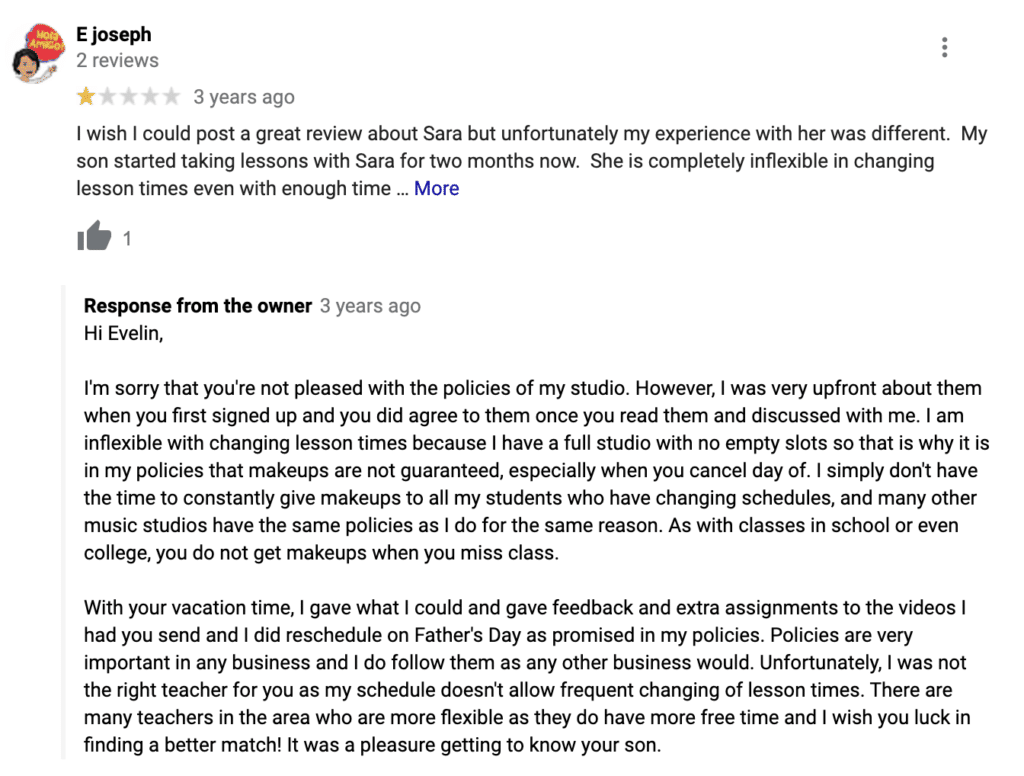
Not Trusting Your Gut
Many of you who are reading this book at this very moment are getting ready to choose on a piano teacher.
As you do your research, you will receive impressions about which studio/piano teacher to choose. Based on my experience, these feelings should not be ignored.
I can’t tell you how many potential students I’ve personally spoken to who, after their piano lessons experience went south, said something like, “I had a feeling to [fill in the blank] but for [fill in the blank] reason, I decided not to…and now I wish I had.”
This is not exactly the most scientific approach to choosing a piano teacher, but there are tremendous differences in studios and teachers.
If problems arise while you’re a student taking lessons with said teacher (not uncommon), all you have to rely on is the integrity of the people you’ve entrusted your piano future with.
Do your best to ensure they are worthy of that trust and you’ll likely be fine.
What Next? Select Below to Learn More About Lessons and Discover if This Is the Studio for You

Kids & Teen Lessons
Build their self-esteem. Playing the piano is meant to be fun and engaging, not stale and boring.

Adult Lessons
It’s never too late to start playing the piano. You’ll be surprised at how quickly you can play music.

